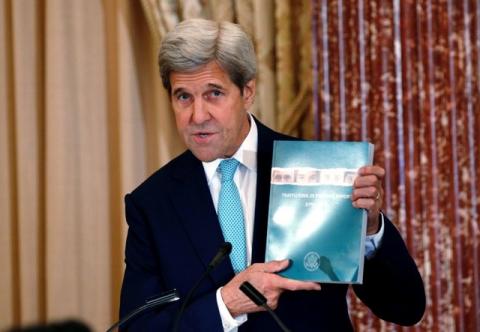Advertisement
U.S. downgrades Myanmar, raises Thailand in human trafficking report
WASHINGTON (Reuters) - The United States on Thursday placed Myanmar on its list of worst human trafficking offenders for failing to do more to curb widespread abuses, and upgraded Thailand from the lowest grade for what was deemed to be an improved record.
The State Department demoted Uzbekistan to the bottom tier in its annual assessment of global efforts to combat human trafficking, just a year after giving a higher rating to the central Asian country, where a state-orchestrated forced labor system underpins its vital cotton industry.
Turkmenistan, which also forces citizens into the cotton fields, joined Haiti and Sudan among the countries downgraded to the lowest level in the closely watched Trafficking in Persons (TIP) report.
The report also highlighted the continuing Syria refugee crisis and reiterated the accusation that almost all sides in the civil war there, including government forces as well as U.S.-backed Syrian Kurdish YPG fighters, were recruiting child soldiers. Syria remained on the lowest tier.
The State Department opted to keep Malaysia at the higher ranking it received last year, which at the time was essential to maintain its eligibility for an ambitious Asia-Pacific free trade pact that U.S. President Barack Obama has championed.
Human rights groups especially welcomed downgrades for Myanmar and Uzbekistan, strategically important U.S. partners, and said such moves could help restore credibility to the report. Critics had contended that politics trumped human rights in some of last year’s key ranking decisions.
“The Uzbek case appears to signal that they’re making the ranking decisions based more on the situation on the ground rather than other factors," said Matthew Fischer-Daly, coordinator for the Cotton Campaign advocacy coalition.
U.S. Secretary of State John Kerry insisted that ranking decisions were based strictly on human trafficking and do not take into account “political and other factors.”
“We’re talking about slavery, modern-day slavery,” he said at a ceremony at the State Department. “We have the ability to fight back."
PRODDING MYANMAR'S NEW GOVERNMENT
The downgrade for Myanmar, first reported by Reuters earlier this week, appeared aimed at prodding the country’s new democratically elected government and its still-powerful military to do more to curb the use of child soldiers and forced labor.
It was also meant to send a message of U.S. concern about continued persecution of the Rohingya Muslim minority in the Buddhist-majority nation.
The reprimand came despite U.S. efforts to court Myanmar to help counteract China’s rise in the region and build a Southeast Asian bulwark against Beijing’s territorial assertiveness in the South China Sea.
The country’s new leader, Aung San Suu Kyi, a Nobel Peace Prize winner, has been criticized internationally for neglecting the Rohingya issue since her administration took office this year.
Myanmar’s neighbor, Thailand, as reported earlier by Reuters, was taken off the list of worst-performing countries, a move that could help smooth relations with Bangkok’s military-run government. Some human rights advocates have argued that a higher grade was undeserved because of continuing abuses in the multibillion-dollar Thai seafood industry.
The reports sort countries into four categories: Tier 1 for nations that meet minimum U.S. standards; Tier 2 for those that are making significant efforts to do so; Tier 2 "Watch List" for those that deserve special scrutiny; and Tier 3 for countries that fail to fully comply with the minimum U.S. standards and are not making significant efforts to do so.
A Tier 3 rating can trigger sanctions limiting access to U.S. and international aid. But U.S. presidents frequently waive such action.
(Editing by Susan Heavey and Jeffrey Benkoe)



















Add new comment